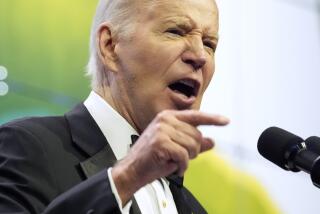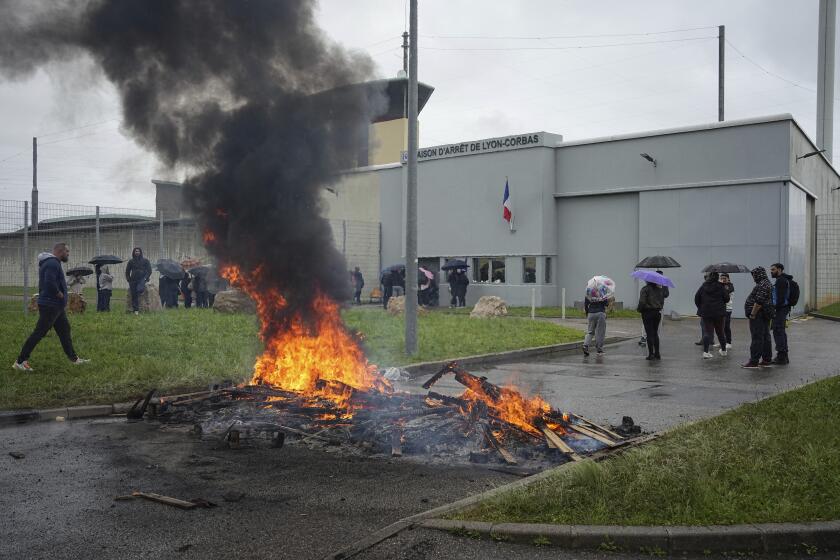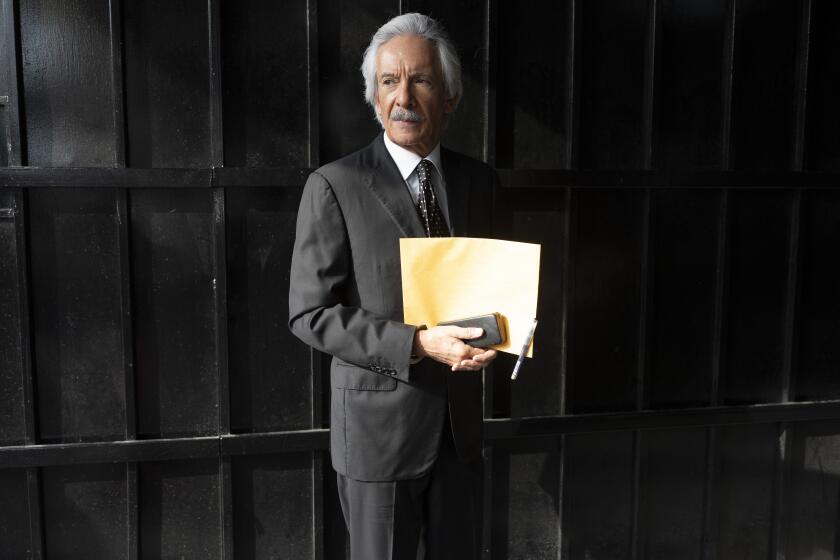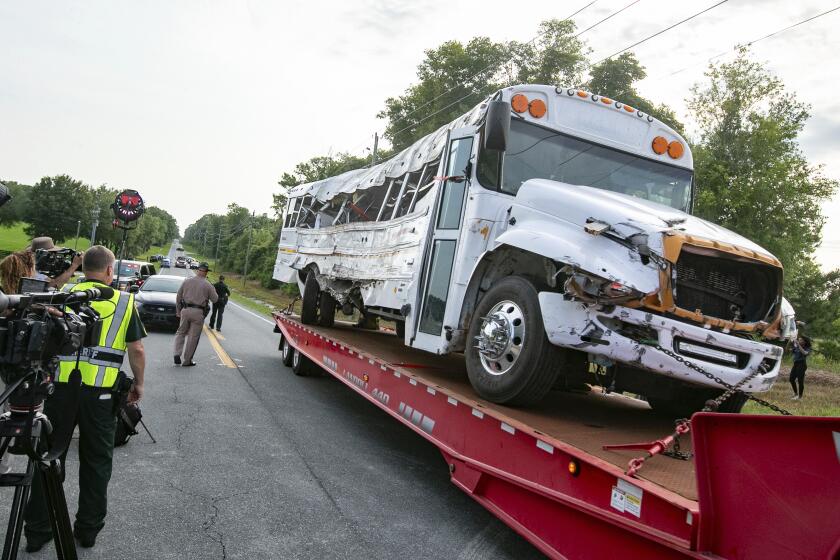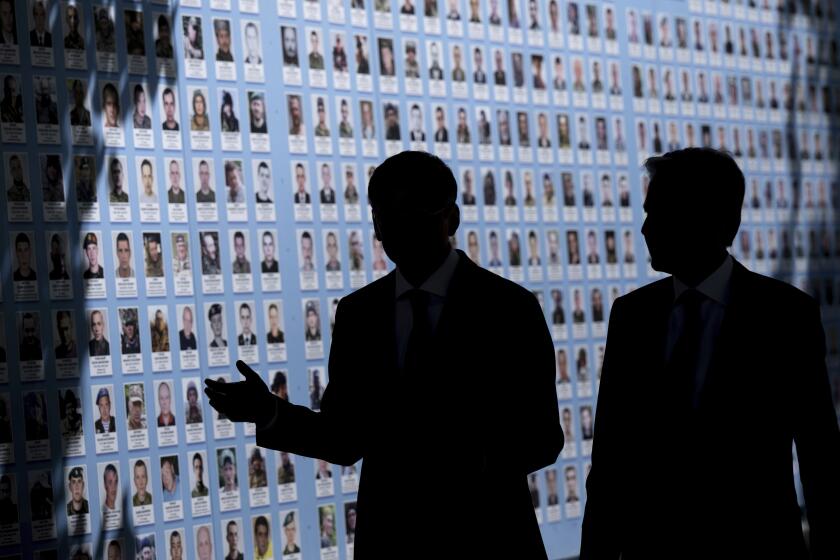‘Democracy Is Not Easy,’ Rice Says of Unstable Iraq
National security advisor Condoleezza Rice struck a new note of humility in a speech to veterans Monday, acknowledging that “democracy is not easy” and urging patience following last week’s deadly bombings in Baghdad and Jerusalem.
“We must remain patient,” Rice told the annual convention of Veterans of Foreign Wars in San Antonio. “When Americans begin a noble cause, we finish it. We are 117 days from the end of major combat operations in Iraq. That is not very long.”
Rice stressed that she believes U.S. forces are making progress in Iraq -- a theme repeated often in recent days by President Bush and his top advisors -- and that guerrilla and bomb attacks are a sign of desperation by their opponents.
Defense Secretary Donald H. Rumsfeld, who also addressed the veterans group, compared Iraqi attacks on U.S. troops to those by die-hard Nazis after World War II.
“Like the death squads in Iraq, [the Nazi remnants] failed to stop the liberation of Germany,” Rumsfeld said. “The resistance our coalition faces today may appear more significant than otherwise might have been the case.”
But to a greater degree than in previous remarks, Rice used her speech to emphasize that success in rebuilding Iraq and forging peace between Israelis and Palestinians is likely to come in modest increments. Both conflicts, Rice said, “will require a commitment of many years.”
“It is also true that democracy is not easy. Its institutions are not the natural embodiment of human nature,” Rice said. “And our own history should remind us that the union of democratic principle and practice is always a work in progress.”
Evoking the lesson of slavery, Rice added: “Knowing the difficulties of America’s own history, we should always be humble in singing freedom’s praises. But America’s voice should never waver in speaking out on the side of people seeking freedom.”
Rumsfeld insisted that despite last week’s bombing of U.N. headquarters in Baghdad, U.S. commanders -- including Army Gen. John Abizaid, the head of the U.S. Central Command -- remain confident that they do not need more American troops on the ground to improve security in Iraq.
“There are some recommending that more U.S. forces go in,” Rumsfeld told reporters after meeting with military personnel at Lackland Air Force Base, also in San Antonio. “I can tell you that if Gen. Abizaid recommended it, it would happen in a minute. But he has not recommended it.”
Rumsfeld’s remarks were seen as a kind of response to comments a day earlier by Sen. John McCain (R-Ariz.), who said the U.S. was “in a race against time” and called for the deployment of another division, or as many as 17,000 troops.
Sen. John F. Kerry of Massachusetts, a contender for the Democratic presidential nomination who also addressed the veterans group, accused the Bush administration of poor planning for the war.
“The mission will not be over until we win the peace -- and until the last man and the last woman come home. That is now very much at stake,” said Kerry, a Vietnam veteran. “Let me put it plainly: In Iraq, even more than Afghanistan, our postwar planning has failed to do the job, and in the process we’ve overextended our troops and our reserves.”
On the Israeli-Palestinian conflict, Rice insisted that despite “the horrific events of recent days” -- including a bus bombing in Jerusalem that killed 21 people-- “we have seen real progress toward peace.”
“Amidst this progress came last week’s familiar images of bloodshed and violence by those who would use terror to destroy the hopes for peace,” Rice said. “But the terrorists will not succeed.”
The more modest approach to the Israeli-Palestinian conflict was also reflected in the administration’s decision to send Richard L. Armitage, the deputy secretary of State, to visit Israeli and Palestinian leaders as early as next week.
The administration is reluctant to send higher-ranking officials with any significant new initiative as long as the prospects for success seem so small, State Department officials said.
“You don’t want to invest the stature of the office if you’re probably going to get no return,” one said.
Armitage had already planned visits to Egypt, Jordan and Iraq, and after the latest outbreak of violence, the administration expanded his itinerary to include Israel and the Palestinian Authority, the officials said.
At the same time, officials stressed that they expect Armitage to reiterate the administration’s current message rather than offer any new initiative. Armitage will probably urge the two sides to make small concessions, following the path laid out in the American-sponsored peace plan known as the road map, in hopes of gradually restoring confidence.
U.S. officials have been trying to enlist Arab and European officials in bringing pressure on the Palestinians to take stronger action against Hamas and other terrorist groups. Although the peace plan urges both sides to avoid damaging the prospects for peace with violence, U.S. officials have not been pressuring the Israelis to halt their attacks on Hamas.
“We understand the kinds of steps they need to take in self-defense,” the official said. “There probably isn’t that much of an edge on the message we’re giving to the Israelis.”
At the same time, the administration is urging the Sharon government to remember “the kind of steps we need to get back into the road map,” he said.
Associated Press was used in compiling this report.
More to Read
Start your day right
Sign up for Essential California for news, features and recommendations from the L.A. Times and beyond in your inbox six days a week.
You may occasionally receive promotional content from the Los Angeles Times.


